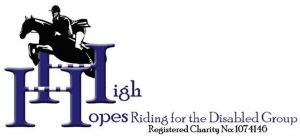
What is RDA?
The Riding for the Disabled Association, known as RDA, is a federation of Member Groups, which are dedicated to improving the lives of people with disabilities, through the provision of opportunities for riding and/or carriage driving. Groups enable people to improve their health and wellbeing, delivering a real and lasting therapy that not only benefits mobility and co-ordination, but encourages confidence and self worth whilst having fun.
RDA bring together more than 500 volunteer groups throughout the UK
More than 23,000 adults and children enjoy the benefits of riding or carriage driving
Each year more than 18,000 dedicated volunteers give a total or more than 3.5 million hours of their time
The Association was founded in 1965 as the Advisory Council on Riding for the Disabled with 9 Member Groups and became Riding for the Disabled Association in 1969 when membership had grown to 80 member groups. The president at that time was Lavinia, Duchess of Norfolk with HRH The Princess Anne as Patron. The Association used an office in the British Horse Society building and moved it to its current location at Stoneleigh Park in 1975. 1975 also saw the introduction of Carriage Driving as an activity and RDA drivers took part in the first World Driving Championships in 2002. In 1986 HRH the Princess Royal took over as President.
The first RDA National RDA Dressage Championships took place in 1981 and were expanded to include all RDA disciplines with the First RDA National Championships.
The association now has over 500 Member groups which cater for more than 24,000 Riders and carriage drivers.
The Benefits of Riding & Driving for the Disabled
Horses offer a special kind of freedom to people with physical and mental disabilities. Those who struggle to walk, or even sit up straight, discover the delights of genuine mobility whilst taking advantage of the therapy to be enjoyed whilst sitting on the back of a well-trained pony, or driving a pony and trap. The exercise helps to improve muscular control, teaches balance and co-ordination, and often reactions and morale improve too. The ability to control a horse as well as one’s own body inspires self-confidence, responsibility and teamwork. Best of all, it is a thoroughly enjoyable experience, which creates a special relationship between rider/driver and horse, and promotes personal challenges. Many mentally and physically disabled and autistic children have spoken their first words to, or about, their ponies as a response to the love that grows between horse and rider. Only when you see the pleasure and sense of achievement on the face of a disabled person as they approach their horse or pony, can you truly appreciate the value of riding and driving for the disabled.
Riding gives over 24,000 children and adults an unforgettable experience each year, through RDA. Horse riding offers an opportunity for enjoyment, challenge, friendship, laughter, achievement, independence and confidence. Medical professionals recognise that there are also significant therapeutic benefits for the rider. The warmth and three dimensional movement of the horse is transmitted through the rider’s body, gradually making it more relaxed and supple, reducing spasms and improving balance, posture and co-ordination. Riding offers an element of risk, often denied to many people, especially those who have been affected by an accident or serious illness and offers them the chance to regain mobility and a sense of achievement. People with congenital disabilities discover a new freedom in movement. Those with progressive diseases can retain mobility and activity longer and often take up Carriage Driving when they can no longer ride.
Carriage driving has been an important part of RDA since 1975 and there are now almost 100 groups involved giving opportunities to over 1000 drivers. RDA Carriage Driving is open to all members of RDA and is particularly useful for people who can no longer ride due to disability or prefer a different kind of challenge.
You can find out more about the RDA by visiting their website
Copyright © 2026 | MH Corporate basic by MH Themes